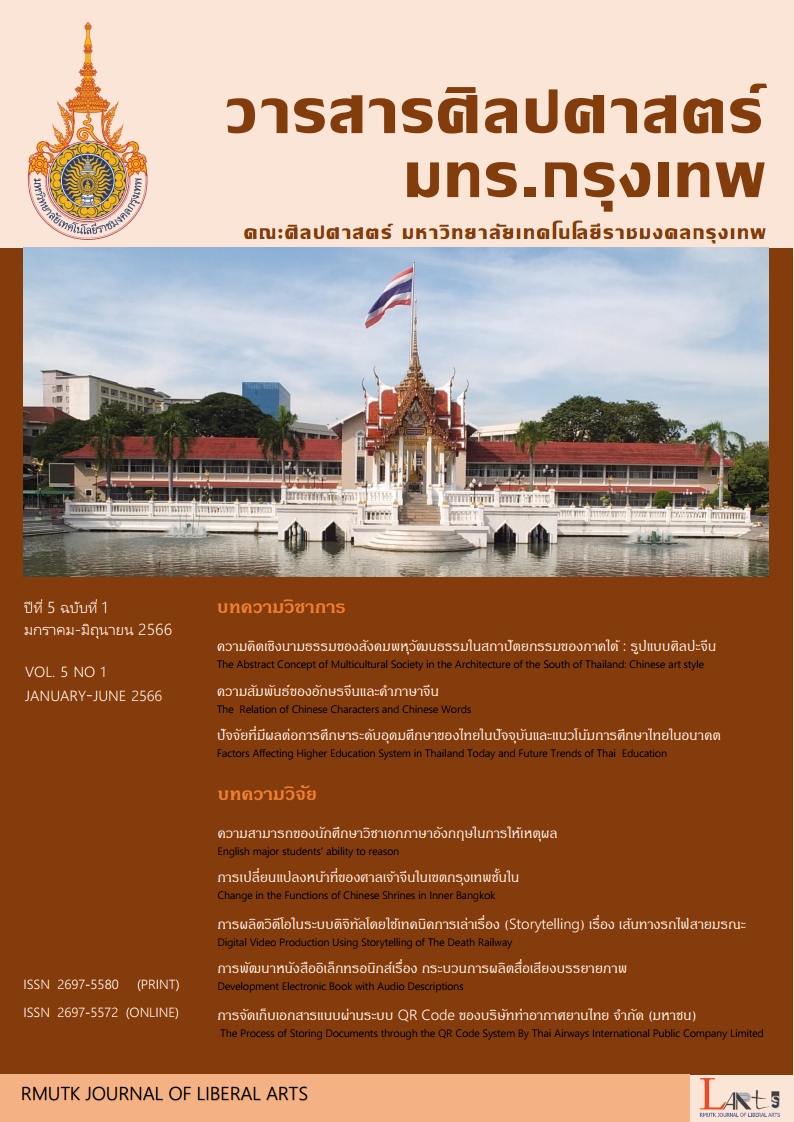ความสามารถของนักศึกษาวิชาเอกภาษาอังกฤษในการให้เหตุผล
Main Article Content
บทคัดย่อ
งานวิจัยนี้วัดความสามารถในการให้เหตุผลของนักศึกษาวิชาเอกภาษาอังกฤษ โดยมีผู้ประเมินจำนวน 3 ท่านเป็นผู้ตรวจให้คะแนนความเรียงเชิงโต้แย้งของนักศึกษา นักศึกษาเขียนตอบคำถามแสดงความเห็นด้วยหรือไม่ในประเด็นที่ว่ามหาวิทยาลัยควรจัดการเรียนการสอนแบบออนไลน์แทนแบบต่อหน้า โดยนักศึกษาต้องให้รายละเอียดและเหตุผลประกอบการแสดงความเห็นอย่างเฉพาะเจาะจง ระบุแหล่งอ้างอิงที่ให้มา และเขียนความเรียงที่มีความยาวประมาณ 450–500 คำ การประเมินความเรียงนี้ดำเนินการแบบเชิงรวมทีละย่อหน้าจากระดับ 1 (ต้องปรับปรุงมาก) ถึงระดับ 5 (ยอดเยี่ยม) โดยพิจารณาความเกี่ยวข้องของเนื้อหากับประเด็นที่ถาม โอกาสที่เนื้อหานั้นจะได้รับการตอบรับเมื่อคำนึงถึงมุมมองของสาธารณชนทั่ว ๆ ไป ความน่าเชื่อถือของข้อมูล ความเป็นไปได้ที่จะจูงใจให้ผู้อ่านเห็นด้วยกับจุดยืนของผู้เขียน งานวิจัยนี้พบว่าความสามารถในการให้เหตุผลของนักศึกษาวิชาเอกภาษาอังกฤษกลุ่มนี้อยู่ระหว่างระดับต้องปรับปรุงถึงระดับดีมาก โดยเฉลี่ยนักศึกษามีความสามารถอยู่ในระดับดีพอสมควร นอกจากนี้ ยังค้นพบข้อเสนอแนะสำคัญสำหรับการศึกษาวิจัยต่อไปให้คำนึงถึงความตรงไปตรงมาและความชัดเจนเข้าใจง่ายของเหตุผลเมื่อมีการประเมินคุณภาพของการให้เหตุผล
Article Details

อนุญาตภายใต้เงื่อนไข Creative Commons Attribution-NonCommercial-NoDerivatives 4.0 International License.
เอกสารอ้างอิง
Bickenbach, J.E. & Davies, J.M. (1997). Good Reasons for Better Arguments: An Introduction to the Skills and Values. Broadview Press.
Bipinchandra, J. S., Shah, P. M., Puteh, S. N., Din, R., Rahamat, R. & Aziz, J. A. (2014). User Needs Analysis in Learning Argumentative Writing via Mobile Platform. Procedia Social and Behavioral Sciences. 118: 198–205.
Cambridge University Press 2019a. Argument. https://dictionary.cambridge.org/dictionary/english/argument (19 October 2019).
Cambridge University Press 2019b. Argumentation. https://dictionary.cambridge.org/dictionary/english/argumentation (19 October 2019).
Daly, B. (1997) Writing Argumentative Essays. http://www.ltn.lv/~markir/essaywriting/modelmp.htm (27 October 2022).
Deane, P. & Song, Y. (2014). A Case Study in Principled Assessment Design: Designing Assessments to Measure and Support the Development Argumentative Reading and Writing Skills. PsicologiaEducavita. 20, 99–108.
Domenech, M. & Krah, A. (2014). What Familial Aspects Matter? Investigating Argumentative Competences of Learners at the Beginning of Secondary Schooling in the Light of Family-based Resources. Learning, Culture and Social Interaction. 3: 77–87.
ETS–TOEFL. (2023). The TOEFL Test. https://www.ets.org/toefl (30 April 2023).
Hawthorn English Language Centres. (1997). IELTS to Success. John Wiler & Sons.
Hughes, W. & Lavery, J. (2008). Critical Thinking: An Introduction to the Basic Skills. Ontario: Broadview Press.
IELTS. (2023). About Us. https://www.ielts.org/ (30 April 2023).
Kaewneam, C. K. (2022). A Guild to Practice Argumentation: Reasoning Tasks. KpKn.
Kaewpet, C. (2018a). Criteria and Scale for Argumentation. Theory and Practice in Language Studies, 8, 564–569.
Kaewpet, C. (2018b). Quality of Argumentation Models. Theory and Practice in Language Studies, 8, 1105–1113.
Kaewpet, C. 2018c. Quality of Argumentative Essays Written by Thai students. Proceedings of CreTech 2018. 24–26 July, 217–222. Rajamangala University of Technology Krungthep.
Kaewpet, C., Duangpattra, K., Ackaradejruangsri, E. & Na Phairee, N. (2019). The Influence of Reasoning and Writer’s Voice on the Overall Quality of Argumentation. Proceedings of CreTech 2019. 19–21 June: 168–174. Rajamangala University of Technology Krungthep.
Kaewpet, C., (2019a). 1 214 403 Argumentative Writing. Faculty of Liberal Arts, Rajamangala University of Technology Krungthep (photocopied).
Ka-Kan-dee, Maleerat & Kaur, Sarjit. (2015). Teaching Strategies Used by Thai EFL Lecturers to Teach Argumentative Writing. Procedia Social and Behavioral Sciences, 208, 143–156.
Liu, F. & Stapleton, P. (2014). Counterargumentation and Cultivation of Critical Thinking in Argumentative Writing: Investigating Washback from a High-stakes Test. System, 45, 117–128.
Martin, J. R. (1989). Factual Writing: Exploring and Challenging Social Reality. Oxford University Press.
Morgan, W. & Beaumont, G. (2003). Using a Chat Room to Develop Early Adolescent Students’ Argumentative Writing. Journal of Adolescent and Adult, 47, 146–157.
Noroozi, O., Biemans, H. & Mulder, M. (2016). Relations Between Scripted Online Peer Feedback Processes and Quality of Written Argumentative Essay. Internet and Higher Education. 31: 20–31.
PBS LearningMedia. (2014). Argumentative Essay: Citing and Analyzing Evidence. https://www.pbslearningmedia.org/resource/6c92dbfe-e060-48a6-b3ac-14064b8132ec/argumentative-essay-citing-and-analyzing-evidence/ (22 January 2019).
Qin, J. & Karabacak, E. (2010). The Analysis of Tomlin’s Elements in Chinese EFL University Argumentative Writing. System, 38, 444–456.
Ramage, J. D., Bean, J. C., & Johnson, J. (2010). Writing Arguments: A Rhetoric with Readings. Pearson Longman.
Ritchie, M. & Black, C. (2012). Public Internet Forums: Can They Enhance Argumentative Writing Skills of Second Language Learners? Foreign Language Annuals. 45, 349–361.
Sampson, V. & Clark, D. B. (2008). Assessment of the Ways Students Generate Arguments in Science Education: Current Perspectives and Recommendations for Future Directions. Science Education, 92, 447–472.
Schwarz, B.B, Neuman, Y., Gil, J. & Ilya, M. (2003). Construction of Collective and Individual Knowledge in Argumentative Activity. Journal of English for Academic Purposes, 12, 219–256.
Stapleton, P. & Wu, Y. (2015). Assessing the Quality of Arguments in Students' Persuasive Writing: a Case Study Analyzing the Relationship between Surface Structure and Substance. Journal of English for Academic Purposes, 17, 12–23.
Toulmin, S. (1958). The Uses of Argument. Cambridge: Cambridge University Press.
Toulmin, S., Rieke, R. & Janik, A. (1979). An Introduction to Reasoning. Macmillan.
Weidaucer, M. H. (2000). Tapestry Writing 3. Heinle & Heinle.
Yang, W. & Sun, Y. (2012). The Use of Cohesive Devices in Argumentative Writing by Chinese EFL Learners at Different Proficiency Levels. Linguistics and Education, 23, 31–48.


